To address AC Not Blowing Cold Air, check the thermostat settings, ensure the air filter is clean, and inspect for refrigerant leaks. If issues persist, consult a professional HVAC technician for a thorough diagnosis and repair.
Is your AC Not Blowing Cold Air? Don’t sweat it – understanding the basics can help. When your cooling system falters, it’s essential to grasp the fundamentals before diving into complex solutions. This blog post unravels common reasons behind the AC Not Blowing Cold Air issue, offering beginners a straightforward guide to troubleshoot and address the problem. From simple maintenance tips to identifying potential culprits, empower yourself with the knowledge to restore your AC’s chill factor without the need for advanced expertise.
Frustration of a Malfunctioning AC system

Experiencing the frustration of a malfunctioning AC system can be exasperating, especially when the scorching heat outside makes the need for cool air inside all the more essential. One common and aggravating issue is when the AC is not blowing cold air, turning what should be a sanctuary from the heat into an uncomfortable and sweltering space. Let’s delve into the specifics of this irksome situation point by point.
Anticipation Shattered:
The initial moment of turning on the AC, filled with the hope of a refreshing breeze, is abruptly shattered when you notice the lack of that cool rush. The stark contrast between expectation and reality is disheartening, and the constant reminder of AC not blowing hard becomes a vexing thought.
Uncomfortable Ambiance:
As the malfunction persists, the ambiance of the room transforms into an uncomfortable haven. The stifling heat infiltrates every corner, and the absence of the anticipated coolness intensifies the discomfort. The repeated realization that the AC not blowing cold air becomes a verbal expression of your mounting frustration.
Sleepless Nights:
Nighttime exacerbates the situation. The expectation of a restful sleep in a cool environment is replaced by tossing and turning in the warmth. The AC’s failure to blow cold air transforms the bedroom into a stuffy chamber, making it difficult to escape the echoing refrain of AC not blowing cold air.
Dashed Productivity:
A malfunctioning AC disrupts the routine, affecting productivity and focus. The oppressive heat distracts from tasks at hand, leading to a cascade of irritability. The constant reminder that the AC not blowing cold air serves as a persistent background noise, amplifying the aggravation of reduced efficiency.
Fruitless Adjustments:
In an attempt to rectify the issue, adjusting the thermostat or checking vents becomes a futile exercise. The relentless warmth persists, accentuating the helplessness of the situation. The repetitive acknowledgment that the AC not blowing cold air becomes synonymous with the inability to regain control over your immediate environment.
Costly Repairs Looming:
As frustration mounts, the looming concern of potential repair costs adds a layer of stress. The thought of professional intervention becomes a daunting prospect, and the monetary aspect further compounds the exasperation. The constant echo of AC not blowing cold air becomes a harbinger of potential financial strain.
Signs of AC Not Blowing Cold Air
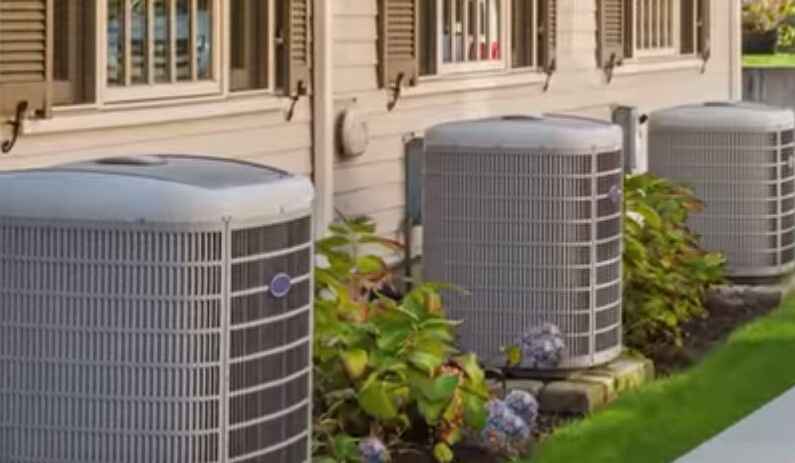
When the scorching heat of summer arrives, a malfunctioning air conditioner can quickly turn a comfortable living space into an uncomfortable one. One of the most common issues people face is their AC not blowing cold air. Identifying the signs early can help prevent further damage and ensure a cool and comfortable indoor environment. Let’s delve into the key indicators that your AC might not be functioning optimally.
Weak or Warm Air Flow:
The most evident sign that your AC unit is not functioning properly is when it starts blowing weak or warm air instead of the refreshing cool breeze you expect. If you notice that the air coming from your vents is not as cold as it used to be, it could be an indication that your AC is not blowing cold air efficiently.
Inadequate Cooling in the Room:
Another noticeable symptom of the AC not blowing cold air is when it struggles to cool the room adequately. Even after running the unit for an extended period, if you find that the temperature indoors remains uncomfortably warm, it’s a clear sign that there’s an issue with the cooling mechanism.
Frequent Cycling On and Off:
If your AC unit seems to be cycling on and off more frequently than usual, it could be a sign of an underlying problem. This irregular cycling may be a result of the system trying to compensate for its inability to produce cold air efficiently. Keep an eye on the frequency of the cycling as it could indicate issues with refrigerant levels, a malfunctioning thermostat, or other components.
Unusual Sounds from the AC Unit:
Pay attention to any strange noises coming from your AC unit, as they can be indicative of problems affecting its cooling performance. If you hear hissing sounds, rattling, or grinding noises, it may suggest issues with the compressor, refrigerant leaks, or other mechanical failures. Addressing these unusual sounds promptly can help prevent further damage to your AC system.
Visible Leaks or Moisture around the Unit:
Inspect the area around your AC unit for any signs of leaks or moisture accumulation. A visible puddle of water or refrigerant near the system could be a red flag that there’s a leak, hindering the unit’s ability to cool the air effectively. Leaks not only impact performance but can also lead to potential health hazards and should be addressed by a professional technician as soon as possible.
AC Not Blowing Cold Air: Identifying and Addressing Common Causes
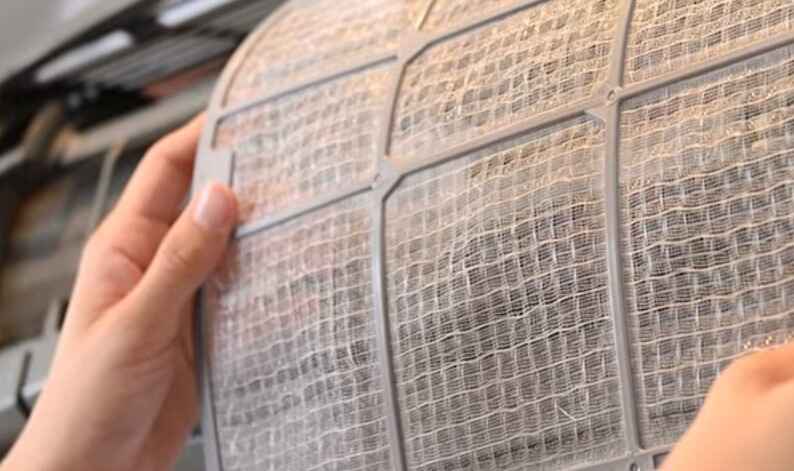
When your air conditioning system fails to deliver the expected cooling, it can be frustrating, especially during the sweltering summer months. AC Not Blowing Cold Air is a common problem that can arise due to various issues. Understanding the potential causes can help you troubleshoot the problem effectively and restore your home’s comfort levels. In this article, we’ll explore the most common causes of an AC not blowing cold air and provide insights into addressing each issue.
Low Refrigerant Levels
Refrigerant is the lifeblood of your air conditioning system, responsible for absorbing heat and facilitating the cooling process. If your AC is not blowing cold air, one of the primary culprits could be low refrigerant levels. This issue can occur due to leaks or improper charging during installation or maintenance. Low refrigerant levels can severely impact the system’s ability to cool effectively, leading to warm air being circulated.
Dirty or Clogged Air Filters
Air filters play a crucial role in maintaining indoor air quality by trapping dust, dirt, and other airborne particles. However, when these filters become excessively clogged, they can restrict airflow, causing your AC not to blow cold air as efficiently as it should. Regularly changing or cleaning your air filters is essential to ensure proper airflow and maintain optimal cooling performance.
Faulty Thermostat
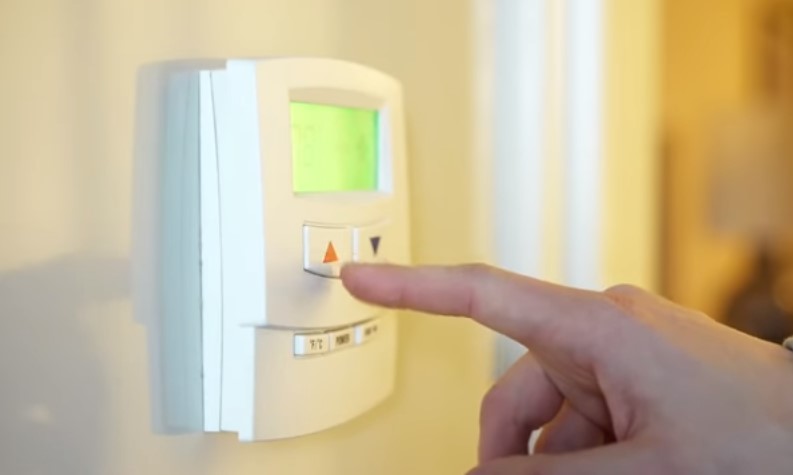
The thermostat is the brain of your HVAC system, responsible for regulating the temperature and controlling when the AC turns on and off. If your AC is not blowing cold air, a malfunctioning thermostat could be the cause. Issues like incorrect settings, poor calibration, or electrical problems can prevent the thermostat from accurately communicating with the AC unit, leading to cooling issues.
Refrigerant Leaks
Refrigerant leaks can be a significant problem for your AC system. These leaks can occur due to various reasons, such as corrosion, wear and tear, or physical damage to the refrigerant lines or components. AC Not Blowing Cold Air can be a direct consequence of refrigerant leaks, as the system loses its ability to effectively transfer heat. Addressing refrigerant leaks promptly is crucial to restore proper cooling and prevent further damage to the system.
Electrical Issues
Your AC system relies on a complex network of electrical components, including the compressor, fan motors, and control boards. If any of these components experience electrical issues, such as faulty wiring, tripped breakers, or power supply problems, it can prevent the AC from blowing cold air or functioning properly. Identifying and resolving electrical issues is essential to ensure the safe and efficient operation of your air conditioning system.
Blocked or Dirty Condenser Coils
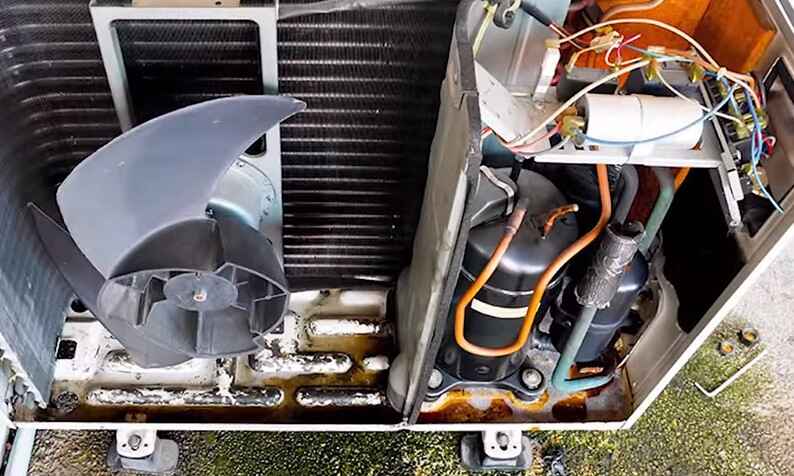
The condenser coils play a vital role in the heat dissipation process of your AC system. When these coils become clogged with dirt, debris, or vegetation, it can impede airflow and reduce the system’s ability to release heat effectively. As a result, your AC may not blow cold air as expected. Regular maintenance, including cleaning the condenser coils, is crucial to maintain optimal cooling performance.
Malfunctioning Compressor
The compressor is the heart of your AC system, responsible for circulating refrigerant and enabling the cooling process. If the compressor fails or experiences issues, it can significantly impact the system’s ability to blow cold air. Compressor problems can arise due to various reasons, such as wear and tear, electrical issues, or lack of proper maintenance. In some cases, a malfunctioning compressor may require replacement to restore proper cooling.
Frozen Evaporator Coil
While it may seem counterintuitive, a frozen evaporator coil can prevent your AC from blowing cold air. This issue can occur due to several factors, including low refrigerant levels, dirty air filters, or restricted airflow. When the evaporator coil freezes, it prevents the system from effectively absorbing heat, leading to warm air being circulated. Addressing the underlying cause of the frozen coil is essential to restore proper cooling.
Identifying the root cause of your AC not blowing cold air is crucial to implement the appropriate solution. Regular maintenance, prompt repairs, and professional HVAC services can help ensure your air conditioning system operates efficiently and provides the desired cooling comfort throughout the year.
AC Not Blowing Cold Air: A Comprehensive Troubleshooting Guide
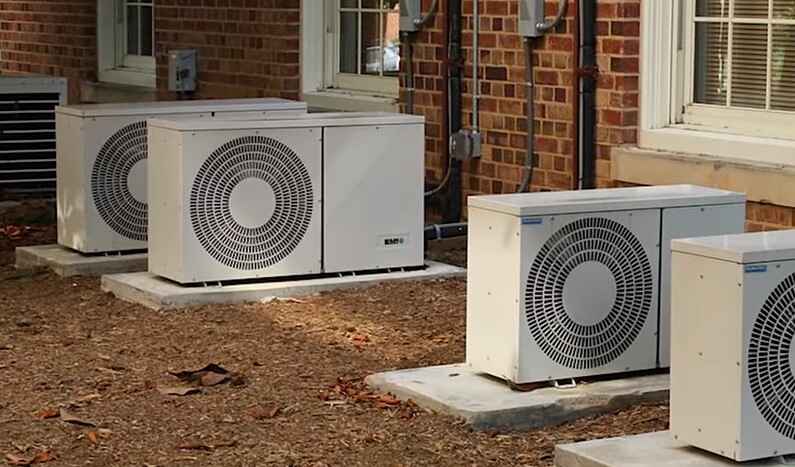
Is your AC not blowing cold air, leaving you sweltering in the summer heat? Don’t worry; we’ve got you covered with a comprehensive step-by-step guide to help you troubleshoot the issue and restore your home’s cool comfort.
Check the Thermostat Settings
When your AC is not blowing cold air, the first step is to check the thermostat settings. Ensure that the thermostat is set to “cool” mode and that the temperature is set lower than the current room temperature. Additionally, check if the thermostat is working correctly by replacing the batteries or resetting it if necessary.
Inspect the Air Filters
Dirty or clogged air filters can restrict airflow, causing your AC not to blow cold air efficiently. Replace or clean the filters according to the manufacturer’s recommendations. A dirty filter can cause the evaporator coil to freeze, preventing the AC from blowing cold air.
Verify the Outdoor Unit’s Condition
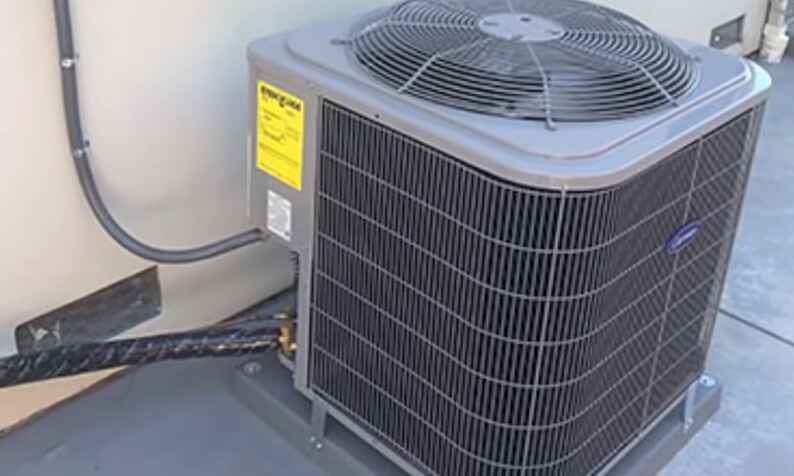
If your AC is not blowing cold air, it’s essential to inspect the outdoor unit. Check for any obstructions around the unit, such as vegetation or debris, that could be blocking airflow. Additionally, ensure that the outdoor unit is level and that the fan is spinning freely.
Examine the Refrigerant Levels
Low refrigerant levels can cause your AC not to blow cold air effectively. Refrigerant leaks are a common issue and should be addressed by a professional HVAC technician. They can detect the leak, repair it, and recharge the system with the correct amount of refrigerant.
Assess the Condition of the Evaporator and Condenser Coils
If your AC is not blowing cold air, the evaporator and condenser coils may be dirty or blocked. A buildup of dirt or debris on these coils can impede heat transfer, reducing the system’s efficiency and causing it not to blow cold air effectively. Clean the coils according to the manufacturer’s instructions or seek professional help if necessary.
Inspect for Refrigerant Leaks
Refrigerant leaks are a common cause of an AC not blowing cold air. These leaks can occur in various parts of the system, such as the evaporator coil, condenser coil, or refrigerant lines. If you suspect a leak, it’s best to call a professional HVAC technician for proper detection and repair.
Check for Electrical Issues
Electrical problems can also cause your AC not to blow cold air. Check the circuit breakers and fuses to ensure they haven’t tripped or blown. Additionally, inspect the electrical connections and wiring for any signs of damage or loose connections.
Examine the Compressor
The compressor is a critical component of your AC system, responsible for circulating the refrigerant. If the compressor fails, your AC will not blow cold air. Compressor issues can be caused by various factors, such as electrical problems, refrigerant leaks, or mechanical failure. If you suspect a compressor problem, it’s best to seek professional assistance.
Thawing a Frozen Evaporator Coil
If your AC is not blowing cold air, the evaporator coil may be frozen. This can be caused by various issues, such as low refrigerant levels, dirty air filters, or a malfunctioning defrost cycle. To thaw a frozen evaporator coil, turn off the AC and let it defrost naturally. Once thawed, investigate and address the underlying cause to prevent the issue from recurring.
By following this step-by-step troubleshooting guide, you can identify and potentially resolve the issue causing your AC not to blow cold air. However, if the problem persists or involves complex repairs, it’s advisable to seek professional assistance from a qualified HVAC technician to ensure the safe and proper functioning of your AC system.
Remember, regular maintenance and timely repairs are crucial for maintaining a reliable and efficient AC system that can provide the cool comfort you need, especially during hot summer months when an AC not blowing cold air can be a significant inconvenience.
Conclusion
In conclusion, troubleshooting and addressing the issue of AC Not Blowing Cold Air requires a systematic approach. From checking refrigerant levels to inspecting air filters and examining the thermostat settings, understanding the root cause is crucial. Regular maintenance, such as cleaning coils and ensuring proper insulation, can prevent future issues. Remember, the key to restoring your AC’s cooling efficiency lies in a combination of DIY checks and when needed, professional assistance. By staying proactive and attentive to your system’s needs, you can enjoy consistent cool air, ensuring comfort in every season. Don’t let the frustration of a warm home linger—take charge and keep your AC blowing cold air effortlessly.

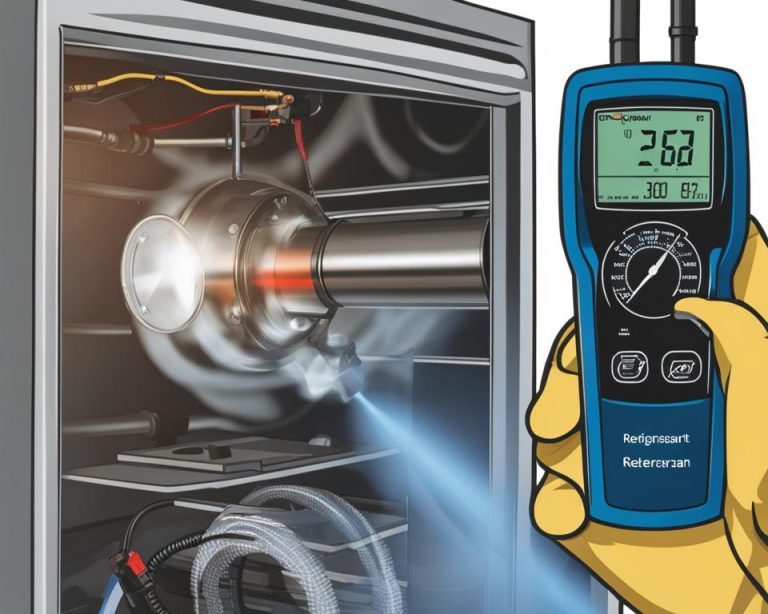
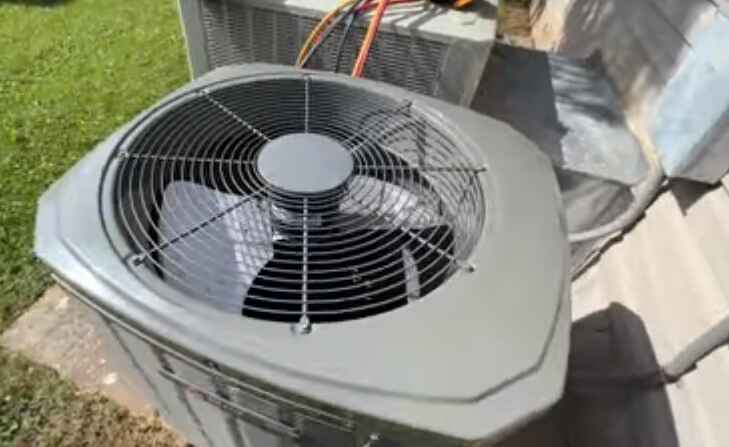

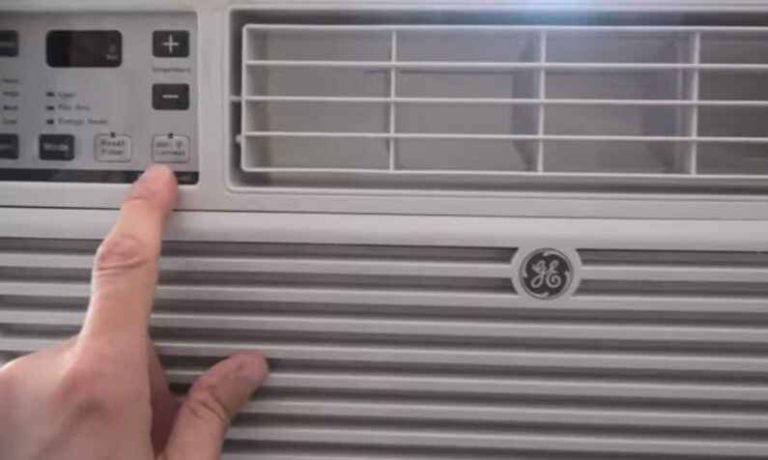
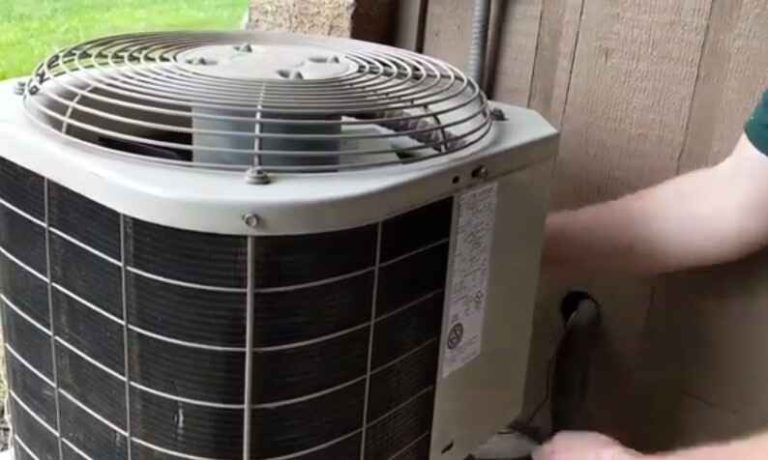
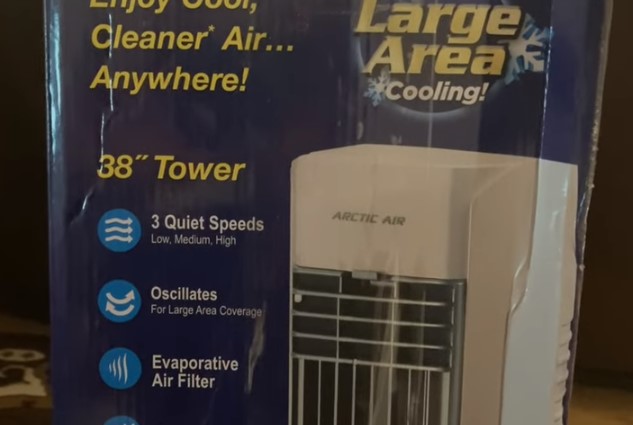
12 Comments